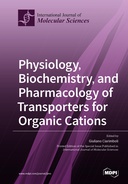Explore

Physiology, Biochemistry, and Pharmacology of Transporters for Organic Cations
0 Ungluers have
Faved this Work
Login to Fave
Membrane transporters are of vital importance for cells. They mediate the flux of many substances through the plasma membrane. In this book, the transporters for organic cations, a special class of membrane transporters, are presented. Transporters belonging to this class are important because they allow many neurotransmitters (e.g., histamine and serotonin) and many drugs (e.g., trospium and tofacitinib) to permeate the plasma membrane. Therefore, transporters for organic cations can modulate the action of neurotransmitters and drugs, having in this way important physiological and pharmacological implications. These aspects are illustrated in original works and reviews presented in this book. Using a system biology approach, the global significance of different transporters working together has been illustrated. Regulation mechanisms determining their expression in specific organs and modulating their function are also described in this book, also concerning their role for special drug toxicities. Such an aspect is also discussed in relationship to mutations (single nucleotide polymorphisms) of transporters for organic cations. Finally, the translational value of studies performed in flies, mice, and rats is discussed. Therefore, this book offers integrative information on transporters for organic cations, which may be of interest to beginners and specialized scientists in this field.
This book is included in DOAB.
Why read this book? Have your say.
You must be logged in to comment.
Rights Information
Are you the author or publisher of this work? If so, you can claim it as yours by registering as an Unglue.it rights holder.Downloads
This work has been downloaded 103 times via unglue.it ebook links.
- 103 - pdf (CC BY) at Unglue.it.
Keywords
- anticholinergics
- antidepressant-like activity
- baricitinib
- bile acids
- Chronic Kidney Disease
- chronic lung diseases
- chronoamperometry
- cisplatin nephrotoxicity
- drug disposition
- drug excretion
- drug transport
- Drug transporters
- drug uptake
- drug-induced kidney injury
- Drugs
- endogenous metabolism
- forced swim test
- functional subgroups
- gene ontology
- genetic polymorphisms
- gut microbiome
- hepatotoxicity
- human pathology atlas
- interorgan communication
- isoflurane
- ketamine
- Kidney
- Kidneys
- lung epithelium
- Malpighian tubule
- mate
- MATE1
- medicine
- n/a
- nephrotoxicity
- nuclear receptor
- OCT
- OCT1
- organic anion transporter
- organic cation transporter
- organic cation transporters
- organic cations
- organic transporters
- Pesticides
- plasma membrane monoamine transporter
- PPAR-alpha
- pulmonary drug delivery
- RA
- Régulation
- remote sensing and signaling
- Remote Sensing and Signaling Theory
- renal excretion
- serotonin clearance
- serotonin transporter
- SLC22
- SLC22A1
- SLC22A15
- SLC22A16
- SLC22A18
- SLC22A1–5
- solute carrier
- solute carrier (SLC) family
- solute carrier 22 (SLC22)
- species differences
- tail suspension test
- TCGA
- tofacitinib
- transport
- transporters
- trospium
- β2-agonists
Links
DOI: 10.3390/books978-3-0365-0563-3Editions

